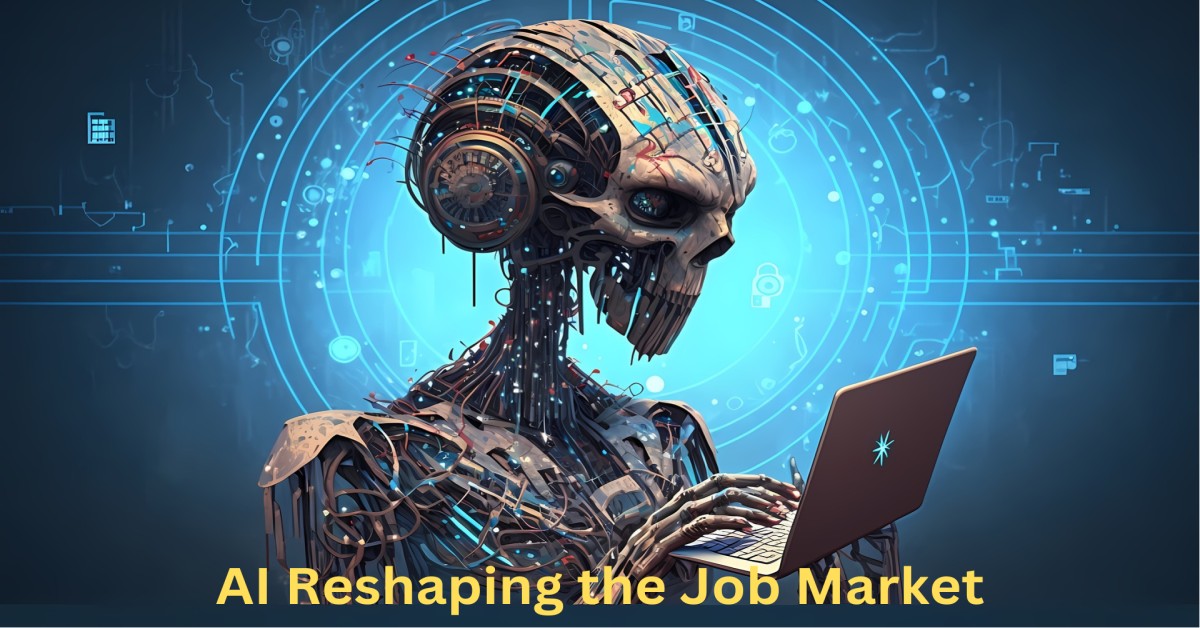Introduction
In recent years, the rapid advancements in Artificial Intelligence (AI) have left an undeniable impact on various industries, including the job market. AI technologies are transforming the way we work, creating new opportunities while also bringing significant changes and challenges. In this article we explores the rise of AI and its transformative effects on the job market, highlighting key trends and considerations for individuals and businesses.
Understanding the Impact of AI on the Job Market
Artificial Intelligence enclosed a wide range of technologies, such as machine learning, natural language processing, and robotics, that enable computers to perform tasks that typically require human intelligence. As AI becomes more sophisticated, it is revolutionizing the job market in several ways.
Automation and Job Displacement
One of the primary effects of AI on the job market is automation. AI-powered systems can automate routine and repetitive tasks, leading to increased efficiency and productivity. However, this automation also poses challenges, as it can result in job displacement for workers performing these tasks. Roles such as data entry, assembly line work, and customer support are particularly vulnerable to automation.
Job Transformation and Upskilling
While AI may replace certain job roles, it also brings forth opportunities for job transformation and upskilling. As routine tasks become automated, workers can focus on higher-level responsibilities that require critical thinking, creativity, and emotional intelligence. This shift encourages individuals to develop new skill sets, enabling them to adapt and thrive in the changing job landscape. Skills such as data analysis, programming, and AI expertise are increasingly in demand.
Emerging AI-Related Job Roles
The rise of AI has given birth to new job roles and opportunities. These include AI specialists, data scientists, machine learning engineers, and AI ethicists, among others. Organizations require professionals who can develop, deploy, and maintain AI systems, as well as ensure ethical considerations in AI implementation. These emerging job roles offer promising prospects for individuals willing to embrace AI-related fields.
Collaboration between Humans and AI
Rather than viewing AI as a threat, organizations and individuals should focus on leveraging AI as a tool for collaboration. AI can augment human capabilities, enabling workers to perform their tasks more efficiently and effectively. By harnessing the power of AI, humans can make better-informed decisions, streamline processes, and enhance overall productivity.
Job Market Adaptation and Lifelong Learning
As the job market continues to evolve due to AI, individuals must adapt and embrace lifelong learning. Continuous learning and upskilling become essential to stay relevant and competitive. Pursuing educational opportunities, attending workshops, and acquiring certifications in AI-related fields can help professionals future-proof their careers and seize emerging job opportunities.
Industry-Specific Impacts
Different industries experience unique effects of AI adoption. For example, AI in healthcare can improve diagnostics, accelerate drug discovery, and enhance patient care. In finance, AI algorithms enable better risk assessment and fraud detection. Manufacturing benefits from predictive maintenance and optimized supply chain management through AI systems. Understanding industry-specific implications is vital for professionals seeking to navigate the evolving job market.
Addressing the Challenges and Concerns of AI in the Job Market
While the rise of AI presents exciting opportunities, it also brings certain challenges and concerns that need to be addressed.
Job Displacement and Reskilling
One of the primary concerns regarding AI in the job market is the potential displacement of workers due to automation. Routine and repetitive tasks that can be easily automated are at risk. To address this challenge, a proactive approach to reskilling and upskilling becomes essential. Encouraging workers to acquire new skills that align with emerging job roles and leveraging lifelong learning opportunities can help individuals transition to more complex and higher-value tasks that complement AI technologies.
Ethical Considerations and Algorithmic Bias
The ethical implications of AI implementation in the job market cannot be ignored. Concerns arise regarding algorithmic bias, as AI systems may inadvertently perpetuate discrimination or inequality. It is crucial to ensure that AI algorithms are designed and trained with fairness, transparency, and accountability in mind. Companies and policymakers should prioritize ethical guidelines and regulations to prevent unintended consequences and promote inclusive decision-making.
Data Privacy and Security
The integration of AI in the job market relies heavily on data collection and analysis. This raises concerns about data privacy and security. Organizations must establish robust data protection measures, including encryption, access controls, and compliance with relevant regulations. Transparency and consent are vital aspects of maintaining user trust and safeguarding sensitive information. Striking the right balance between utilizing data for AI advancements and respecting privacy rights is crucial.
Bridging the AI Skills Gap
The rapid pace of AI development has created a significant skills gap in the job market. There is a shortage of professionals with expertise in AI, machine learning, and data science. To address this challenge, investments in education and training programs focused on AI-related fields are necessary. Collaboration between academia, industry, and government can help bridge this gap by promoting research, developing relevant curricula, and providing accessible opportunities for individuals to acquire AI skills.
Conclusion
The rise of AI is reshaping the job market, presenting both opportunities and challenges. As AI technologies continue to evolve, businesses and individuals need to adapt to this changing landscape. By understanding the impact of AI, leveraging its benefits, addressing concerns, and implementing strategies for adaptation, we can embrace the transformative power of AI while ensuring a sustainable and inclusive job market for the future.

